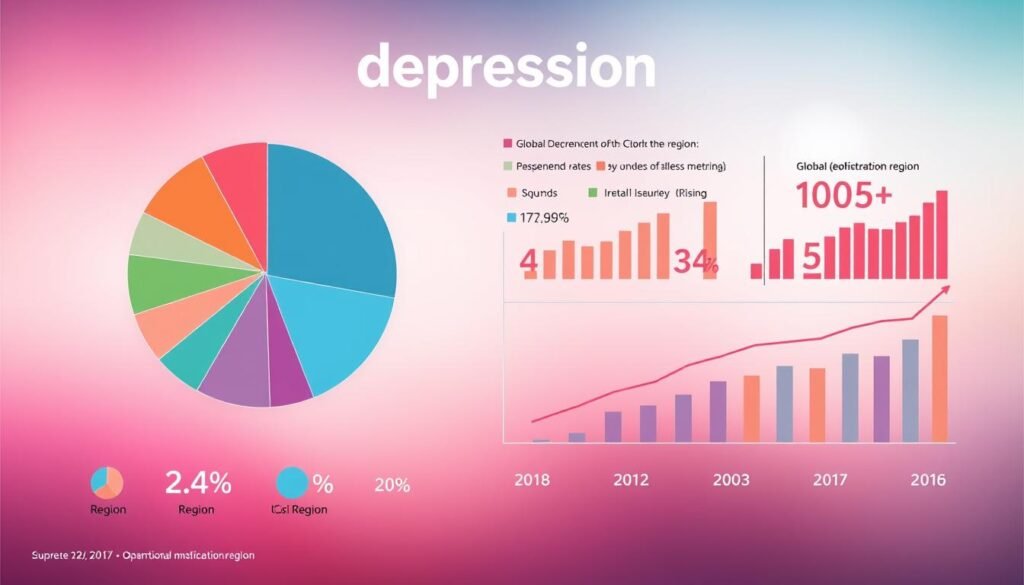Did you know that pharmacogenomic testing for major depression could save British Columbia’s health system about $956 million over 20 years? This fact highlights how genetic testing could change mental health care. It allows doctors to create more personalized treatment plans. By understanding someone’s genes, healthcare providers can choose the best antidepressants for them.
Genetic testing looks into genes linked to mental health. This method not only offers a better way to recover but also may reduce treatment-resistant depression. It’s a big deal for those fighting mental health issues. For more insights on genetic testing and depression, click here.
Key Takeaways
- Genetic testing for depression can significantly impact medication effectiveness and selection.
- Studies indicate genetic factors account for up to 42% of variance in antidepressant responses.
- The implementation of pharmacogenomic testing may lead to 37% fewer cases of treatment-resistant depression.
- Patients utilizing genetic testing often experience 15% more time without depression symptoms.
- Future projections show potential reductions in mortality and hospital admissions with genetic testing.
- Though promising, the current clinical utility of genetic testing in psychiatry may not meet widespread applicability, according to experts.
Understanding Depression
Depression is a serious mental health issue worldwide. It’s a mood disorder that affects how you feel daily. Knowing the types of depression and symptoms is key for correct diagnosis and treatment.
What is Depression?
Depression is mainly known as major depressive disorder. It brings long periods of sadness and a loss of interest in fun activities. It can mess with thinking, leading to trouble making decisions and thoughts of suicide. Recognizing these signs is key to grasping this widespread issue.
Types of Depression
Different types of depression exist, each with unique signs and causes. These include:
- Major Depressive Disorder: This type causes deep emotional pain.
- Persistent Depressive Disorder: This chronic version lasts over two years.
- Perinatal Depression: Impacts women during or after pregnancy.
- Psychotic Depression: Includes false beliefs or seeing things.
- Seasonal Affective Disorder (SAD): Related to changes in seasons and sunlight.
- Bipolar Disorder: Involves shifts between extreme highs and lows.
Symptoms and Diagnosis
Knowing symptoms of depression helps with early help and proper care. Common signs include:
- Feeling sad or in a low mood always
- Not enjoying things you used to
- Eating more or less than usual
- Problems with sleep
- Hard time focusing or deciding
- Feeling worthless or guilty
- Thinking about suicide or death
To diagnose depression, these symptoms must last over two weeks and greatly impact daily life. Doctors use interviews, tests, and sometimes physical exams to identify it.
How Prevalent is Depression?
Depression’s reach across the globe is vast and telling. Current stats show how it touches lives everywhere. Different studies show it varies from place to place. It is key to understand these factors to fight the stigma around mental illness.
Statistics and Demographics
Around 350 million people suffer from depression, says the World Health Organization. It’s more common in some places than others. For example, rates go from 3% in Japan to 16.9% in the USA. Most countries have rates between 8% and 12%. By 2020, it was expected to be a top cause of disability worldwide.
Depression affects some groups more than others. If a family member has it, you’re more likely to have it too. The risk is 2 to 3 times higher. This suggests genes play a role. But, finding a specific cause is hard. It’s likely a mix of genes, environment, and mind factors.
Stigma Surrounding Depression
The stigma around mental health is still a big issue. This fear stops many from getting help. They wrongly see depression as a weakness or failure. Breaking down this stigma is vital for better care and open talks about mental health.

| Region | Prevalence (%) |
|---|---|
| Japan | 3% |
| United States | 16.9% |
| Global Average | 8% – 12% |
Causes of Depression
Understanding what causes depression involves looking at genes, the environment, and mind factors. Everyone’s depression experience is different, based on these factors.
Genetic Factors
Genes play a key role in depression. If your close family member has depression, your own risk goes up 2-3 times. Mood disorders can be about 50% inherited. This shows a strong genetic link to depression risk.
Environmental Influences
Our environment greatly impacts our mental health. Childhood trauma, long-term stress, and tough life events can lead to depression. Traumatic experiences and stress are known to trigger depression. This underlines the role of environment in mental health.
Life Stressors and Trauma
Life’s big stresses matter when we talk about depression causes. Losing a job, relationship issues, or a health crisis can trigger it. Over 19 million Americans struggle with depression, often linked to such stressors. Understanding this link helps in making better treatment plans that tackle both mind and environment issues.

Treatment Options for Depression
There are many ways to treat depression, from traditional paths like medicine and talking to a therapist. It’s important to find what works best for each person. Knowing all the choices can help improve life for those dealing with depression.
Traditional Methods: Therapy and Medications
Common treatments include therapy methods like cognitive behavioral therapy (CBT) and antidepressants. Some people might have to try different combinations to find relief. About 30% struggle with depression that doesn’t respond well to the first treatments tried.
Talking to mood disorder experts can help. They can adjust medications and add new therapies or advanced procedures. Learning about your medicine and how to stick with your treatment plan is crucial.
A New Era: Personalized Medicine
Nowadays, personalized medicine for depression is changing the game. Genetic tests help doctors choose better medications. This means fewer guesses in treatment and a better chance of feeling better. For instance, those with access to genetic testing like the GeneSight test are more likely to improve within 24 weeks.

With genetic insights, doctors can avoid drugs that might cause bad reactions. This new approach offers hope for those hard-to-treat cases. It’s crucial to look into these modern treatment options for depression carefully.
| Treatment Method | Effectiveness | Considerations |
|---|---|---|
| Cognitive Behavioral Therapy (CBT) | Effective for mild to moderate depression | Requires commitment and weekly sessions |
| Antidepressant Medications | Varies; often requires adjustments | Potential side effects and interactions |
| Genetic Testing | Increases likelihood of successful treatment | Helps avoid ineffective medications |
| Electroconvulsive Therapy (ECT) | Effective for severe treatment-resistant cases | Used when other treatments fail |
| Vagus Nerve Stimulation (VNS) | May provide ongoing relief | Requires implantation; not suitable for everyone |
Genetic Testing for Depression: What You Need to Know
Genetic testing is changing how we understand and treat depression. It looks at certain genes that might affect a person’s depression and how they react to treatments. This testing, based on pharmacogenomics, helps in choosing more effective, personalized treatments by identifying genetic risks.
What is Genetic Testing for Depression?
It looks at your DNA to find risk factors for depression passed down in families. This test shows how you might react to depression medicines. By using a cheek swab or saliva test, doctors can make treatment plans based on your genes.
How It Works and What to Expect
To start, a small DNA sample is taken. A lab then analyzes this sample. A detailed report shows how your genes might affect the way you react to depression medicines.
- Personalized Treatment Plans: This helps in knowing which medicines will work better or might cause side effects.
- Enhanced Medication Selection: This helps avoid guesswork in finding the right medication.
- Improved Outcomes: Studies have shown that genetic testing leads to better depression treatment results.
As research continues, genetic tests for mental health are getting more accurate and reliable. Studies suggest that these tests can really help in reducing depression symptoms. So, considering genetic testing for depression management is becoming increasingly important.
Benefits of Genetic Testing for Depression Medications
Genetic testing is key in managing depression medications. It provides tailored insights that enhance treatment. This approach helps healthcare providers pick medications more likely to work and less likely to cause adverse reactions. Studies show a significant increase in the chances of achieving remission, thanks to benefits of genetic testing.
How Genetic Testing Improves Treatment Outcomes
Treatment guided by pharmacogenetics leads to a 70 percent higher chance of remission than standard care. It ensures medications match an individual’s genetic makeup. Studies also show a 30 percent decrease in adverse drug reactions, making treatment safer.
Reducing Trial and Error in Medication Selection
The usual trial and error in choosing medications can prolong suffering. Genetic testing cuts down this process. It helps healthcare providers find drugs with minimal drug-gene interactions.
59 percent of patients who underwent genetic testing received medications without known interactions. This was only 26 percent in the standard care group. This speed in finding the right medicine also cuts the chance of hospitalizations by half.
The Role of Pharmacogenomics in Mental Health
Pharmacogenomics is vital in learning how genes affect drug reactions, especially for mental health. It looks at gene variations that impact how drugs work. This leads to better treatment plans for issues like Major Depressive Disorder (MDD). It’s changing how treatments are customized for each person’s needs.
Understanding Pharmacogenomic Testing
Pharmacogenomic tests check genetic markers related to drug metabolism. Important genes like CYP2C19 and CYP2D6 are focused on. Finding out a patient’s genes helps doctors make personalized plans. This could lead to better results and fewer side effects. About one-third of MDD patients find relief with their first treatment, showing personalized care is critical.
Research Findings on Pharmacogenomic Benefits
Research has shown big benefits for patients who get pharmacogenomic testing. In studies of 4,767 patients, those with test-guided medication improved more within eight weeks. Those with past treatment failures saw a 41% better chance of getting better. Drug responses for MDD patients are between 42% and 53%, underlining these methods’ value.
| Study Findings | Response Rate with Pharmacogenomic Testing | Standard Treatment Response Rate |
|---|---|---|
| Reported Improvement after 8 Weeks | 66% | Around 40% |
| Response Rate for Patients with Severe MDD | 75% | Approximately 50% |
| Higher Chance of Remission with PGx-guided Treatment | 41% | Unknown |
Latest researches provide a big chance to boost how effective mental health treatments are. Almost 60% of how well drugs work is because of genetic factors we don’t see. By using regular screening and learning about pharmacogenomic data, we can get better outcomes. This means more people can find relief from their symptoms.
Considerations and Limitations of Genetic Testing
Genetic testing offers insights into mental health, yet it’s not without its flaws and ethical issues. Gene variations might not always lead to clear outcomes, influencing treatment choices. There are also big concerns about keeping genetic data private.
For those with hard-to-treat symptoms or a family history of depression, genetic testing can be useful. But, it’s important to know the risks involved.
Potential Risks and Ethical Concerns
Genetic testing can bring up sensitive info that poses ethical challenges. The main risks are:
- Privacy Issues: Genetic details can expose health secrets you might want to keep hidden.
- Discrimination: You could face unfair treatment from jobs or insurance based on your genes.
- Misinterpretation: There’s a chance you might misunderstand your test results, causing worry or false hope.
These issues make some people think twice about genetic testing. It’s crucial to carefully weigh these ethical concerns before deciding.
Who Should Consider Genetic Testing?
It helps to know who could gain from genetic testing to make smart choices. Those who might benefit include:
- People with depression in their family or other mental health issues.
- Individuals who haven’t found relief with standard treatments.
- Patients looking to understand their mental health better through genetics.
This knowledge allows mental health experts to tailor treatments better, improving outcomes.
Conclusion
The way we treat depression is changing, thanks to the use of genetics. This new method is more personalized. It helps us understand who might get major depressive disorder, a condition affecting about 20% of U.S. people. A summary of genetic testing for depression shows it could lead to better treatment choices. This could improve mental health care outcomes.
Many people are interested in genetic testing. But, they worry about genetic discrimination and privacy. Research shows those with a family history of mental illness often want testing. Still, there are concerns over how genetic data might be used. Getting tested by trusted medical professionals can help ease these worries. It ensures the test results are correctly understood.
Looking at the future of depression treatment, understanding the mix of genetics and environment is key. Evidence shows genetics matter, but they’re only part of the story. Advances in genetic testing hope to provide better treatment options. They also aim to open new paths to recovery for many worldwide.